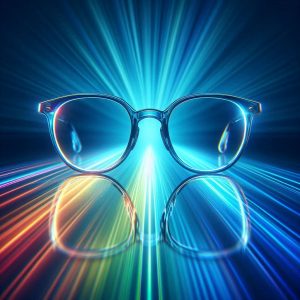-
See the Difference: Save $1,000 on LASIK , Find More
*Must mention this promotion and be treated before April 30 of 2025 to qualify. $1,000 off for both eyes on standard Wavelight price, $500 off for one eye. Cannot be combined with any other offers.
Do Blue Light Glasses Save Your Eyes (and Your Sleep)?
Blue light glasses are touted as a revolutionary solution to our hyper-connected world. We spend an inordinate amount of time glued to digital screens – laptops, smartphones, tablets. It’s no wonder that many of us experience eye strain, headaches, and sleep disruptions. But the real question is do blue light glasses truly live up to the hype? Let’s take a look into the science behind blue light and explore whether these trendy specs are a legitimate path to digital wellness.
Blue Light: A Double-Edged Sword
Blue light possesses a shorter wavelength, translating to higher energy compared to other visible light types. While sunlight is a natural source of blue light, excessive exposure, particularly from artificial sources, can lead to:
- Eye Strain and Fatigue: Ever feel your eyes burning after a long screen session? Blue light exposure can contribute to this discomfort.
- Disrupted Sleep Patterns: Blue light throws a wrench into your melatonin production, the sleep hormone. This can make falling asleep and staying asleep a challenge.
However, blue light isn’t all bad. It also plays a crucial role in:
- Regulating Alertness: Blue light exposure helps keep us awake and focused during the day.
- Cognitive Function: Research suggests blue light may positively influence our memory and cognitive performance.
Do Blue Light Glasses Work?
Blue light glasses are designed to filter out some of the blue light emitted from digital devices. The theory is that by reducing blue light exposure, these glasses can alleviate symptoms like eye strain and improve sleep quality. The jury’s still out on effectiveness, as the research on blue light glasses remains inconclusive. Some studies show minimal benefits, while others report subjective improvements in user experience.
The current landscape has mixed evidence as studies haven’t reached a definitive consensus on whether blue light glasses significantly reduce eye strain or prevents dry eyes. There is also a potential bias of some studies promoting blue light glasses, as they are funded by companies with a vested interest in their sales.
Beyond Blue Light Glasses: Protecting Your Eyes
While the jury’s out on blue light glasses, there are proven ways to minimize blue light exposure and promote eye health:
- The 20-20-20 Rule: Every 20 minutes, look away from the screen for 20 seconds and focus on an object 20 feet away. This simple practice helps relax the focusing muscles in your eyes.
- Adjust Screen Settings: Most devices offer built-in features to adjust screen brightness and reduce blue light emission during nighttime hours.
- Prioritize Eye Care Habits: Maintain good eye health with regular eye exams and by using lubricating eye drops to combat dryness.
- Consider Light Therapy: If you experience significant sleep disruptions, consult your doctor about light therapy, which can help regulate your sleep-wake cycle.
If you experience persistent eye strain, blurry vision, or frequent dry eyes, even after implementing these strategies, schedule an appointment with your eye doctor. They can assess your specific needs and recommend the most appropriate course of action.
The science surrounding blue light and its long-term effects on our eyes is still evolving. While blue light glasses may offer some benefits for certain individuals, research hasn’t found a significant improvement in vision or sleep quality. In the meantime, prioritize healthy eye habits and screen breaks to minimize blue light exposure and safeguard your vision.
YOU MIGHT ALSO LIKE...
VISION CENTERS NEAR ME
Enter your zip code, city, or a doctor name below to find a vision center.
Find out if LASIK is right for you
Congratulations!
Your vision issues can most likely be corrected with a LASIK procedure. Schedule a free consultation today.
Answer 5 simple questions to see if you are a candidate
What is your age group?
Do you wear...
With corrective lenses, do you have...
Have you ever been told that you have astigmatism?
Have you ever been told that you have dry eyes?
Request an Information Kit
Learn about your surgeon, the latest advanced technology, procedures, options and benefits, financing options, and what to expect from your LASIKPlus experience.










